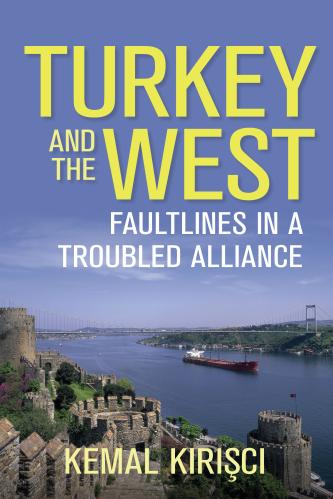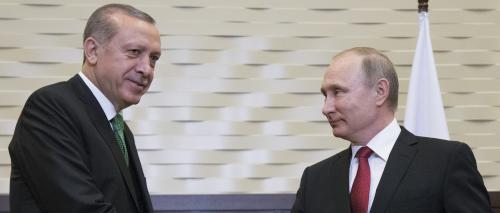Turkey and Russia have a centuries-long history woven together by eras of conflict and halfhearted cooperation. In recent years, the two countries have moved closer together under the increasingly authoritarian leadership of Turkish President Erdoğan and Russian President Vladimir Putin. In September, Turkey rebuffed NATO warnings and finalized a deal to purchase advanced S-400 air defense missile systems from Russia, a move Erdoğan called a matter of Turkey’s national security. Russia, Turkey, and Iran are also seeking deeper cooperation on Syria, where despite clashing interests, the three are negotiating an end to the conflict on their own terms. Finally, and after a brief halt in 2016 due to political tensions, Russia’s State Atomic Energy Corporation (Rosatom) is set to build a $20 billion nuclear power plant in southern Turkey, which some estimate to become operational by 2023.
Many of these moves are pragmatic and instrumental. Turkey, like many European nations, relies extensively on Russia for its energy needs. In Syria, Turkey and Russia need one another’s cooperation to achieve their security interests. Geopolitically, Turkey uses its relationship with Russia as leverage vis-à-vis its European and NATO partners, whereas Putin sees Turkey as a wedge he can drive into NATO and transatlantic solidarity. Yet how far will their tactical cooperation go in binding the two countries in a deeper, strategic partnership?
Brookings scholars Kemal Kirişci and Pavel Baev address this question and many more in their new paper, “An ambiguous partnership: The serpentine trajectory of Turkish-Russian relations in the era of Erdogan and Putin.” On September 19th, the Center on the United States and Europe convened Kirişci and Baev, along with experts Evren Balta of New York University and Naz Durakoğlu, a senior policy advisor to Senator Jeanne Shaheen, to discuss the paper. In a conversation that I moderated, each provided their insights on the state of play in Turkish-Russian relations, and the implications of its uncertain trajectory for the United States and the EU.
A Perplexing Relationship
According to the panelists, growing cooperation between Russia and Turkey is perplexing given their starkly diverging national interests.
The energy sphere, in particular, highlights several contradictions. Turkey’s national security relies on its ability to diversify its energy sources, yet Turkey has taken steps in recent years that have increased its reliance on Russian energy and technology. In 2003, completion of the Blue Stream pipeline increased exports of Russian gas to Turkey, which now accounts for over 50 percent of Turkey’s overall gas resources. More recently, Erdoğan has signaled his approval for the TurkStream pipeline, which, as the paper highlights, will deliver 15.75 billion cubic meters of gas to Turkey and southeastern Europe by 2020. Erdoğan’s decision to grant Rosatom the rights to build the Akkuyu nuclear power plant in southern Turkey is also controversial: As Baev and Kirişci note, it would give Russia “control over a significant portion of Turkey’s electricity production.” In contrast to Turkey’s goals of diversification, both projects will aggravate Turkey’s dependence on Russian energy.
Another perplexing area of cooperation between the two is on Syria and their respective counterterrorism campaigns, as Turkey and Russia maintain directly conflicting interests over Syria’s trajectory and the future of political Islam in the region. First, Russia’s intervention in the Syrian civil war in September 2015 to support the Assad regime fundamentally clashed with Turkey’s priority of removing Assad from power. Russia also shows just enough concern on the question of the Kurds in Syria to expose America’s vulnerability on this tension with Turkey, but not enough to quell Erdoğan’s mistrust. Despite Erdoğan’s vehement disapproval, Moscow has cultivated ties with the Syrian Democratic Union Party (PYD), a strong Kurdish faction operating in Syria, and has drafted a new Syrian constitution that grants significant autonomy to Kurdish regions.
In Moscow, Baev and Kirişci argue that “Putin made a direct connection between Erdoğan’s hostility to the Assad regime in Syria and his embrace of radical Islam.” Russia is home to Europe’s largest Muslim community, which comprises almost 15 percent of the Russian population. Putin respects the religion and its role in Russian society, but perceives of political Islam as a real domestic security threat. Putin is therefore highly distrusting of Erdoğan’s support for and connections to radical Islamic groups in Syria and has an interest in seeing this ideology fail across the region.
In this already fraught context, relations soured dramatically following Turkey’s shoot-down of a Russian fighter plane in November 2015, which led Russia to impose sanctions on Turkey and initiate a vitriolic propaganda campaign against Erdoğan. Yet the sanctions were lifted (aside from those on Turkish tomatoes) and relations were normalized after Erdoğan apologized for the incident in June 2016. Russia, Turkey, and Iran, despite competing interests, have since deepened their cooperation on Syria, launching the “Astana format” in early 2017 to enact a ceasefire and negotiate an end of the Syrian conflict. The three are now working together to implement “de-escalation zones” throughout the country.
How can these contradictory and perplexing moves be explained? One lens through which to understand their cooperation is ideological, as both leaders maintain a mutual distrust of Western intentions.
An Axis of the Excluded?
Erdoğan and Putin see the West’s instruments of democracy promotion as targeted directly at their own regimes. Erdoğan believes the U.S.-based cleric Fethullah Gülen was behind the July 2016 coup that attempted to oust him from power. Similarly, Putin sees American support for civil society actors and democracy activists in Russia and in surrounding countries as pitted against his power. As democratic leaders in the West grow increasingly wary of Erdoğan’s authoritarian order and Putin’s brazen acts of aggression, the two leaders have cozied up to one another. As an illustration of their deeper bond, Putin immediately condemned the 2016 coup attempt against Erdoğan, unlike leaders in Western capitals.
However, the anti-Western thread that runs through both leaders’ narratives is different in fundamental and important ways. Kirişci highlighted that in Moscow, Putin and the Russian elite view Russia as “the true and conservative European civilization, which stands in contrast to western Europe’s postmodern and liberal identity.” Ankara, on the other hand, which has a long history of shared traditions with Europe, began to ideologically transition away from the West following the Arab Spring. Baev and Kirişci write, “Turkish leadership hailed the popular uprisings as a ‘grand restoration’ of Islamic civilization and expected the formation of a ‘Muslim Brotherhood belt,’ stretching across Tunisia, Libya, Egypt, and Syria.” Erdoğan has since attempted to reorient Turkey as the leader of an emerging Islamic civilization in the Middle East.
During the event, Evren Balta also noted that although Erdoğan and Putin sit atop governments with strong statist traditions in which tools of the bureaucracy and the state are used to implement the will of the leader, neither country should be considered a unitary actor. To understand the many contradictions inherent in Turkish-Russian relations, we need to look inside the “black box of authoritarianism” to the competing political coalitions and interests that are shaping the trajectory of this relationship. Indeed, the confluence of various regime, personal and factional interests may account for why Turkey and Russia have sought cooperation on economic, energy, and security-related matters where their national interests diverge.
The confluence of various regime, personal and factional interests may account for why Turkey and Russia have sought cooperation on economic, energy, and security-related matters where their national interests diverge.
Facts Don’t Lie
In spite of their admittedly on-and-off collaboration, cold hard facts belie deeper cooperation between the two, particularly at the expense of Turkey’s relations with the West. The paper highlights that Russian foreign direct investment (FDI) into Turkey constitutes only 3 percent of all FDI into Turkey between 2007 and 2015, while FDI originating from EU member states during this time made up a substantially larger 73 percent. The EU is also Turkey’s top trading partner, and Turkey exports goods of greater value to the United States than it does Russia, where most of Turkey’s exports are agricultural. Overall, as Naz Durakoğlu stated at the event: “When Turkey looks at Europe, there is a strong economic link. When Turkey looks at the U.S., there is a strong security link. When Turkey looks at Russia… this link is not concrete at all. And you can’t build on something that does not have a solid foundation.”
All four panelists agreed that Turkey’s most prosperous path lies in the West.
For these reasons, among others, all four panelists agreed that Turkey’s most prosperous path lies in the West. Baev argued that Turkey’s institutional foundations in the transatlantic arena give the West more leverage in influencing Turkey’s trajectory. “With adversaries,” Baev said, “there is not much room for influence… it is more about containing.” Indeed, Russia is now a staunch adversary of the West with clear intentions to destabilize the United States and fragment solidarity within the European Union and NATO. Therefore, if the West seeks to limit cooperation between these two authoritarian leaders, it should seek to do so through its NATO-bound relationship with Turkey.
Turkey, for its part, is not doing itself any favors regarding developing stronger ties with the West (where most of its economic and security needs are met). Durakoğlu cautioned Turkish policymakers who seem to be “investing a lot in the tolerance of the West,” both in how they are conducting their internal affairs and their affairs with Russia. She elaborated that Ankara would do well to remember that support from the West, while essential, is not unconditional. To illustrate this point, some in the U.S. Congress have acknowledged that Turkey’s purchase of the S-400 missiles from Russia may have violated U.S. sanctions on Russia signed into law last month, thereby automatically triggering the imposition of sanctions on Turkey.
Take a Good Look in the Mirror
Yet tensions are not only driven by Turkey’s leaders, and the main fault line between the West and Turkey lies in the Kurdish question. To maintain Ankara’s allegiance to NATO and to its partnerships in Europe and the U.S., the West must acknowledge the very real security threat Ankara perceives from America’s support of Kurdish forces in the region. It is on this very issue that the West may push Turkey further into Russia’s orbit, despite the overriding differences in their national interests.
Finally, to inhibit greater cooperation between Turkey and Russia, Kirişci argued at the event that Western leaders need to “look in the mirror.” Strategic drift in the West, compounded by President Trump’s questionable commitment to the transatlantic partnership and the U.K.’s decision to leave the EU have had damaging effects on Turkey’s own trajectory. Unlike in the 1990s when the United States and the EU engaged Turkey as part of their efforts to strengthen the liberal international order, today their commitment to the liberal principles, and to Turkey, is less evident. Kirişci warned: “When you become ambiguous about your commitment to upholding the liberal international order, you start to see countries that are part and parcel of that order drift away.”






Commentary
The serpentine trajectory of Turkish-Russian relations
October 4, 2017